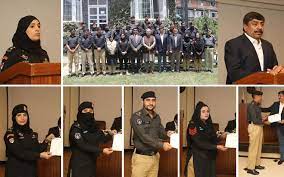PeSHAWAR – The United Nations Development Program (UNDP) in partnership with Khyber Pakhtunkhwa Police delivered its five-day training on gender-responsive policing for men and women officers from Khyber Pakhtunkhwa police. The training was held as part of the European Union (eU)-funded “Deliver Justice Project,” which was co-led by UNDP, UNODC, and UN WOMeN.
The training’s goal was to educate police officers on gender-based crimes and to develop their capacity to effectively prevent and respond to violence against women and other gender minorities in the community. Police officers ranging from Constables to Sub-Inspectors from Peshawar, Kohat, Mardan, Bajaur, Kurram, and Khyber in Khyber Pakhtunkhwa attended the training.
The training curriculum was designed to cover various aspects of gender-based violence (GBV), the treatment of GBV survivors, and how to improve fundamental policing services (first response, basic investigation, evidence collection, and more) to satisfy gender needs. Dr Quraish Khan, Assistant Inspector General (AIG), Directorate of Training, Khyber Pakhtunkhwa Police, kicked off the training. He is a candidate for the UN Women Champion Award this year. On the last day of the training, certificates were awarded to the participants.
The ceremony was virtually attended by Chamila Hemmathagama, Program Manager, Rule of Law Program, and UNDP. UNDP is also collaborating with Khyber Pakhtunkhwa Police to build its first Gender Strategy to make Khyber Pakhtunkhwa Police a more inclusive workplace for all genders. The eU-funded “Deliver Justice programme” aims to support reform processes to ensure the delivery of people-centered justice, improve access to justice for all, particularly women and less privileged groups, and improve security sector service delivery in KP and merged Districts, as well as in Balochistan, following constitutional safeguards and international standards.
Source: The Nation


